Saudi woman seeks asylum in UK after death threats from her family
Woman who fled to Britain with her son claims one relative said they would 'cut off your head like we do to the sheep'

Your support helps us to tell the story
From reproductive rights to climate change to Big Tech, The Independent is on the ground when the story is developing. Whether it's investigating the financials of Elon Musk's pro-Trump PAC or producing our latest documentary, 'The A Word', which shines a light on the American women fighting for reproductive rights, we know how important it is to parse out the facts from the messaging.
At such a critical moment in US history, we need reporters on the ground. Your donation allows us to keep sending journalists to speak to both sides of the story.
The Independent is trusted by Americans across the entire political spectrum. And unlike many other quality news outlets, we choose not to lock Americans out of our reporting and analysis with paywalls. We believe quality journalism should be available to everyone, paid for by those who can afford it.
Your support makes all the difference.A Saudi woman who fled to the UK with her young son after leaving her husband has told a court how she received death threats from relatives – one of whom told her they would “cut off your head like we do to the sheep” for bringing shame upon their family.
The woman, who is in her 30s but has not been named, is claiming asylum in Britain after her decision to separate from her husband angered her family. In one incident recounted to the court, her father attacked her with a piece of furniture and her brother tried to strangle her.
Details of the case emerged in a ruling by the Family Division of the High Court in London. The judge, Sir Peter Singer, heard the evidence in private to protect the identities of the woman and her eight-year-old son.
At an earlier hearing, she said she would have to lead an “impossibly harsh and restricted” life in Saudi Arabia if she was forced to return to her husband. The woman told the judge that both she and her husband’s families were “steeped” in Saudi culture and adhered to the principles of sharia. When she left him, the decision was “not tolerated” by her family, who encouraged her to do her “duty” and return to him to preserve their reputation, she added.
After a family row during which her father and brother turned violent, the woman left her home in Jeddah and travelled to London over the summer, bringing her son with her. The pair have since settled in England, where the woman is hoping to be granted asylum so they can begin a new life.
When her family realised she had disappeared, two of the woman’s brothers sent her text messages in which they abused her “in the most offensive and indeed obscene manner” for leaving her husband and taking her son away, the judge’s ruling says. They also blamed her for making her mother ill.
“They warn her not to return to Saudi Arabia where she is hated and they threaten that they will all three come to London to ‘show you how you will run away from us’,” the ruling states. “They refer to the scandal which her behaviour has heaped on them. There is a vivid threat ‘that if anything happens to her mother I will cut your head off like we do to the sheep’. They claim that ‘No one will protect you now’.”
Although the woman’s husband has said he is prepared to divorce her, the judge was told that as a divorcee under sharia, she would then be expected to obey the orders of her father. This could mean she would never be able to leave her home without his permission and would be unable to get a job, his ruling states.
The judge said the woman would run the risk of “honour-based violence or murder ... from her family” if she returned to Saudi Arabia. He ruled that the little boy should stay in England with his mother instead of returning to Jeddah to live with his father, despite the fact he had been forced to trade his affluent Saudi upbringing for a harder existence in a foreign country.
“His life and mode of upbringing within an affluent family in Jeddah are a world apart from the disrupted and straitened circumstances in which he has lived as a child of an asylum-seeker, with all the restrictions which that status brings,” the ruling says.
Join our commenting forum
Join thought-provoking conversations, follow other Independent readers and see their replies
Comments